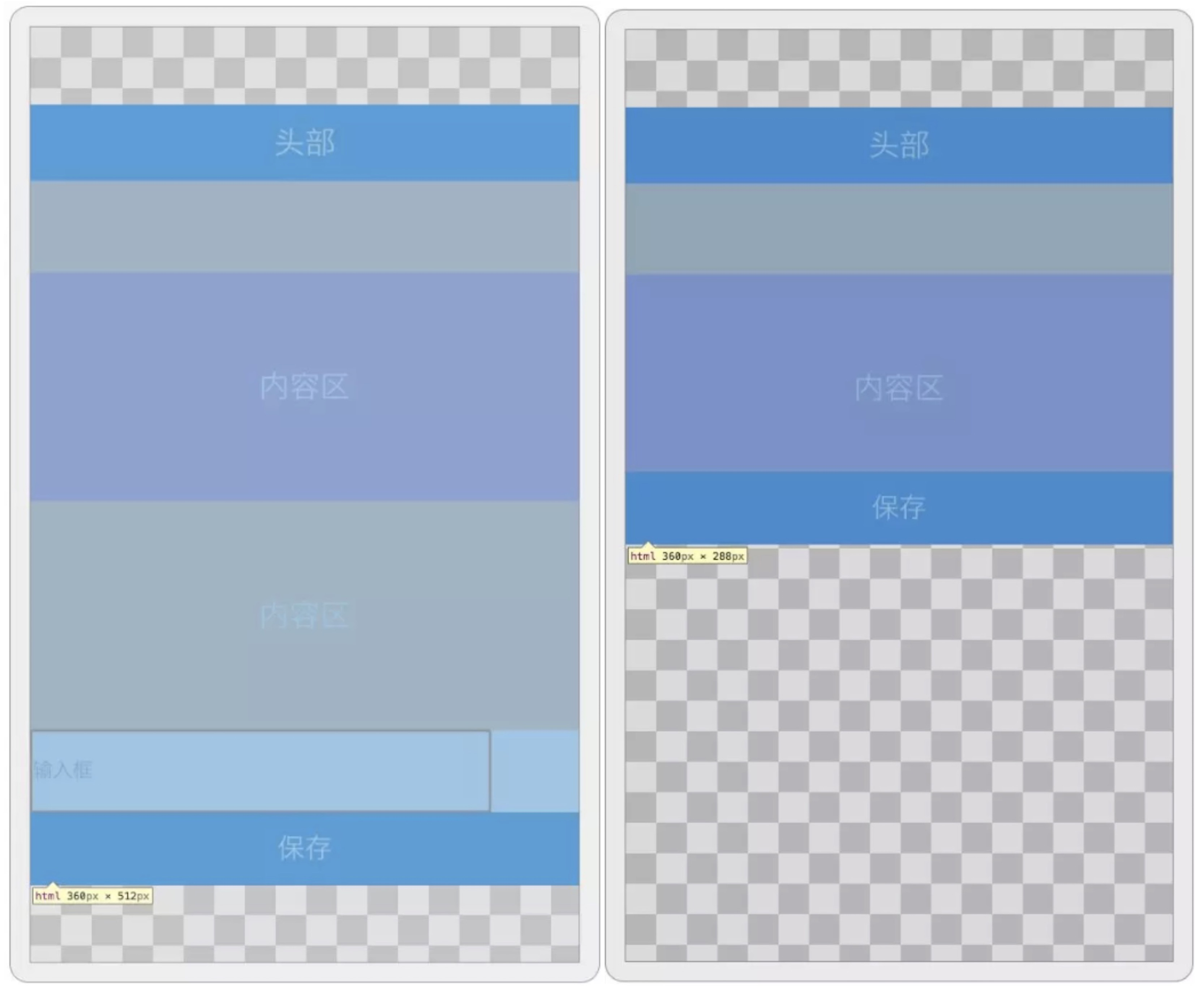Android软键盘弹出,覆盖h5页面输入框问题
之前我们在使用vue进行 h5 表单录入的过程中,遇到了Android软键盘弹出,覆盖 h5页面 输入框 问题,在此进行回顾并分享给大家:
系统:Android
条件:当输入框在可视区底部或者偏下的位置
触发条件:输入框获取焦点,弹出软键盘
表现:软键盘 覆盖 h5页面中的输入框
问题分析:
1.发现问题:当前页面中box为flex布局,内容为上下固定高,中间自适应(中间区域内容过多会出现滚动条,input框在wrapper的底部),input获取焦点,手机键盘弹出,input未上移到可视区内,怀疑是flex布局导致。
h5页面 测试代码如下:
<html lang="en"> <head> <meta name="viewport" content="width=device-width, initial-scale=1, maximum-scale=1"> <meta http-equiv="Content-type" content="text/html; charset=utf-8"/> <style> html,body{ width:100%; height:100%; margin:0; padding:0; } .box{ display:flex; flex-direction:column; width:100%; height:100%; } .header{ height:50px; width:100%; background:#368CDA; text-align:center; line-height:50px; font-size:20px; color:#fff; } .wrapper{ flex:1; overflow:auto; width:100%; } .content { margin:0; padding:0; } .content li{ margin:0; padding:0; list-style:none; height:150px; background:#FFCC99; text-align:center; line-height:150px; font-size:20px; color:#fff; } .content li:nth-child(2n){ background:#CC99CC } .t-input{ width:300px; height:50px; border:1px solid #FF0000; } .footer{ width:100%; height:48px; background: #368CDA; text-align:center; line-height:48px; font-size:18px; color:#fff; } </style> </head> <body> <div class="box"> <div class="header">头部</div> <div class="wrapper"> <ul class="content"> <li>内容区</li> <li>内容区</li> <li>内容区</li> <li>内容区</li> <li>内容区</li> </ul> <input type="text" class="t-input" placeholder="输入框"> </div> <div class="footer">保存</div> </div> </body> </html>
2.修改布局:去除box中的flex布局,将wrapper、footer通过position:absolute的方式定位在页面中,发现input依旧不上移,判定与flex布局无关,代码修改如下:
<style> .box{ /* display:flex; flex-direction:column; */ width:100%; height:100%; position:relative; } .wrapper{ /* flex:1; */ overflow:auto; width:100%; // 通过同时设置top、bototm,撑开wrapper,使之占屏幕除header和footer外的剩余高 position:absolute; top:50px; bottom:48px; } .footer{ width:100%; height:48px; background: #368CDA; text-align:center; line-height:48px; font-size:18px; color:#fff; position:absolute; bottom:0; } </style>
3.真机模拟:进行真机与电脑连接调试,打开chrome的chrome://inspect,(如下图所示),发现键盘未弹出时html高度为512px,键盘弹出后html的高度为288px(减少区域的为软键盘区域),怀疑是否是因为html、body设置了height:100%的自适应布局后,高度跟随屏幕的可用高度改变而改变导致的。

4.代码调试:去除body的height:100%,给body添加一个正好能让软键盘弹出后遮住输入框的高度,body高度 = 288(软键盘出现后html高度)+50(输入框高度)+48(保存按钮高度) ,发现键盘弹出遮挡着input后,input框会自动上移到可视区内,问题定位成功。
解决方案:
方案1 页面渲染完成后,通过JS动态获取屏幕可视区高度(注:屏幕旋转后,需重新获取屏幕高度并赋值),并将其赋值到body的height,这样body的高度一直都是屏幕的高度,当软键盘弹出后,会将body向上推(因为body有了固定高度,不会再继承html的自适应高度),使输入框置到可视区内,代码如下:
document.body.style.height = window.screen.availHeight +'px';
方案2 我们可以借助元素的 scrollIntoViewIfNeeded() 方法,这个方法执行后如果当前元素在可视区中不可见,则会滚动浏览器窗口或容器元素,最终让它可见,如果当前元素在可视区中,这个方法什么也不做,代码如下:
window.addEventListener('resize', () => {
if (document.activeElement.tagName == 'INPUT') {
//延迟出现是因为有些 Android 手机键盘出现的比较慢
window.setTimeout(() => {
document.activeElement.scrollIntoViewIfNeeded();
}, 100);
}
});





 浙公网安备 33010602011771号
浙公网安备 33010602011771号